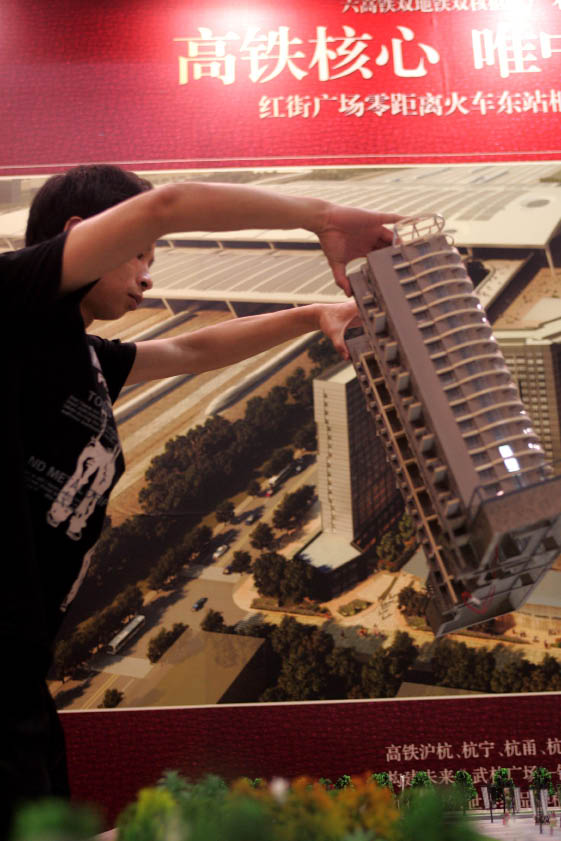A New Lifestyle in Jiaxing
By special correspondent OUYANG LIANG

| Newsmore | ||||||
|
| Culturemore | ||||||
|
| Tourismmore | ||||||
|
| Economymore | ||||||
|
| Lifemore | ||||||
|
| Around Chinamore | ||||||
|
| Culture |
| A New Lifestyle in Jiaxing By special correspondent OUYANG LIANG  The new high-speed railway has become a marketing carrot for real estate along its corridor.CFP IT was 11 a.m., on October 25, 2010, when I arrived at Wang Jinlan’s home, one of a group of villa houses in Fengqiao, Jiaxing City. Wang Jinlan had just got back with her mother from tending her plot on the other side of the road.
Wang cordially showed us in and brought out from the kitchen some steaming boiled corn on the cob, inviting us to try them. “They’re home-grown. I just gathered them this morning and they are totally delicious.” The corn was as sweet and juicy as she promised, more delicious by far than anything you could buy from the market. The “oohs” and “aahs” and “yummies” were not long coming. The compliments made Wang Jinlan so delighted that she opened the back door to show us the ducks she was raising. The backyard was like an altogether different world. Wang had dug a water channel through her lawn connecting with the broader waterway beyond, allowing the ducks to splash between the two. “Raising ducks is just for fun and for adding a bit of spice to life,” she says with a smile. This is a typical rural life, but Wang is actually not a farmwife. She is a native of Shanghai and has a home in downtown Hongkou District. This villa, to be precise, doesn’t belong to her, but to her younger brother. “We have four siblings in our family, all of us with property in Shanghai. But, none of us was able to provide a house spacious enough for a big family gathering. So we planned to buy a villa.” The younger brother, a successful businessman, had the money, but after scouring the suburbs they failed to find anything to fit the bill. In May 2009, Wang Jinlan and her younger brother came to Fengqiao to check out in person the Taoyuan Xiaozhou, a residential community named after the Peach Garden paradise depicted 1,500 years ago. “We took a fancy to the house at first sight and had no hesitation about buying it.” According to Wang, white-walled, black-tiled dwellings, dainty bridges across gurgling streams, and willows swaying in the breeze are all but non-existent in big cities like Shanghai. It was a smart decision: purchase prices have doubled since then. “We aren’t selling places to live, but a different lifestyle,” asserts Yan Xinqing, assistant to the general manger of Jia-xing Zhongzheng Real Estate Co., Ltd., the company that developed the villa community. “Shanghai is a battleground, a place to fulfill your values in life and develop your potential. As a result Shanghai dwellers are perennially super-stressed. Even when they go out to catch a movie, often it’s not just to relax but to be cool, keeping up with what’s in fashion.” “But life here is quite different; even time slows down. People practice shadow boxing, go to the temple in the town to meditate, or grow fruit and vegetables on nearby plots,” says Zhu Juanying, the company’s sales manager. An incentive of two growing plots for villa purchasers was introduced at the sales launch. “The 900-plus units in the Phase I development have all been snapped up, 90 percent of them going to Shanghai buyers.” As Yan Xinqing indicates, convenient transportation is a major lure for the Shanghai market, not to mention the competitive price. “It’s just 10 minutes from the expressway exit and no more than half an hour from Hongqiao Station by high-speed train.” According to Yan, when the development was about to get underway, the company was not really targeting the Shanghai market. But during the 2008 National Day holiday, their stand at the Shanghai Real Estate Fair was besieged by hordes of would-be buyers. On Day 1 about 100 people were shuttled over for an on-site personal inspection, and during the three-day exhibition period the number exceeded 400. “This was totally unexpected, given the downturn in real estate in the wake of the financial crisis.” “Shanghai people feel hemmed in and are always eager for a breath of fresh non-city air. Our project meets their needs exactly,” explains Yan Xinqing. In Shanghai suburbs such as Songjiang and Qingpu districts, similar large-scale villa projects are being developed. “But the environment, atmosphere, rhythm, even the air are not that much different from the downtown. Apart from the larger space, they don’t do much to improve one’s mood.” The launching of the high-speed railway project in 2009 injected new life into the housing market in areas surrounding Shanghai and sales started to peak. “More than half of our new customers were referrals from old customers. This high ratio is extremely rare,” says Zhu Juanying. “We predicted a predominantly retiree market, but our client base turns out to be much more diversified – buying for retirement, holiday use, investment and for personal habitation.” Quite which group Wang’s family falls into is hard to determine. Wang’s mother has her own needs for her old age and Wang Jinlan, though a retiree herself, can’t be totally spared by her family, hence the impossibility of staying with her mother in Fengqiao all the time; her younger brother needs to deal with his business in Shanghai, and can spend little time there, apart from holidays. “We have a number of freelance clients too, and they can reside here quite a bit of the time. In any case, with the high-speed railway the commute will get much easier and leave people with more time to relish their leisure time in peace and quiet,” asserts Zhu Juanying. |
| VOL.59 NO.12 December 2010 | Advertise on Site | Contact Us |